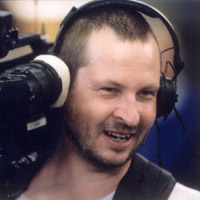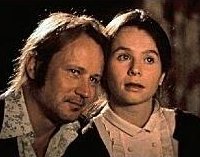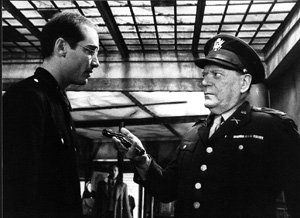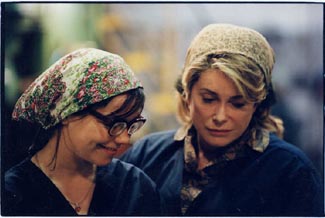
| von
Trier for Dummies Zen and the non-technique of Dogme by Don Thompson |
|
Lars von Trier is arguably the greatest cinema auteur (or anti-auteur, if you prefer) of recent times, although many people in the U.S. (outside of Cinophiles) would be hard pressed to know who he is or what he stands for. Even among intellectuals he remains a mystery, confounding as many as he enlightens. As
a recent von Trier convert, and quasi student (though not yet practitioner)
of the Dogme 95 movement (which some believe now to be dead And
yet von Trier cannot be seen outside of the economics of his filmmaking.
His move to DV with DANCER IN THE DARK may have been as much
out of necessity as of want, and yet the film's theme and technology
meld in a unique statement that could not be made outside of the
form within which he chooses to speak. Nor can his choice to move
the language of his films from Danish to "European" multi-lingual
to English be seen outside of a desire to reach out to a wider audience,
which is in a sense an economic choice as much as an artistic one.
Thematically, there is a continual movement from cynicism to sentiment
The
cynical see this movement of von Trier as a copping out -- von Trier
loses his nerve -- and yet the sentiment he postulates is based
on real human emotion that is lost in a cynical time where the so-called
"cool" have often become enemies to beauty, even as they attempt
to redefine what that word means in the name of egalitarianism.
von Trier becomes a documentarian of the decline of the West (or
evolution of the West, if you like what you see) In the neat, and often unexamined, world of the West created by the sometimes too easy relationship between the cool, the technological, the commercial, the aggressive and the militaristic, our humanity is often compromised, and from this place we often react negatively to von Trier. It is also a world where commodified sentimentality and spirituality, whether that be Disney or the New Age Gurus or the 700 Club, mimics its "secular humanist" consumer-market enemy in order to battle it, and in the course of the battle everyone loses, or maybe everyone wins because they all seem to make money. But still there are real winners and losers, although they are not discussed, for they are not worth our attention. This is the world von Trier critiques. von Trier invites us into his films as if to a place of worship, but with a wink, like Reverend Lovejoy of The Simpsons, whose church placard reads, "We Welcome God and His Victims." I haven't seen all of von Trier's films, but will draw here from THE ELEMENT OF CRIME, ZENTROPA, BREAKING THE WAVES and DANCER IN THE DARK. THE ELEMENT OF CRIME and DANCER IN THE DARK are, respectively, his earliest to his most recent work, with ZENTROPA and BREAKING THE WAVES being in the middle, and each representing an ending and a transition, respectively. As is well known, the idea of Dogme 95 (aside from giving some people migraines) is to break ties with cinematic formalism and free the director and actors to a kind of cinematic truth. Dogme forces the director, by its very nature, to focus on performance and writing -- the raw elements of cinema -- and to negate his role as auteur (at least in theory). This is done by allowing only hand held camerawork and limited lighting, among other non or anti-techniques. It's like making a writer hand write a novel, and illustrate it himself, as Blake did when he first self-published his books. It is also similar to Martin Luther's (the original one) dictums of the Protestant movement, with von Trier nailing the Dogme method on the Cathedral door of cinema's stylistic excesses. Interestingly, Dogme has a similar goal to Hollywood's original "seamless" style -- that is, to remove the sense of an individual director. BREAKING
THE WAVES was one of the first -- if not the first -- Dogme-like
films and also probably the movement's best example of communicating
pure Prior
to BREAKING THE WAVES, with films such as THE ELEMENT
OF CRIME and ZENTROPA, von Trier shows himself a master
of both cinema formalism and intellectual rigor, creating landscapes
of decline and darkness fueled by a Ironically, it is a sentimental interpretation of European culture (rather than a view of Europe as corrupt) -- a Europe idealized by America and epitomized in films such as THE SOUND OF MUSIC -- that von Trier parodies so well in DANCER IN THE DARK. In DANCER, the European (Czech immigrant Selma, played by Bjork) in America is destroyed by a system that makes the innocent guilty through a dehumanizing work environment, forcing the protagonist to Dance in the Darkness of meaningless and mindless labor and brutal system that squeezes the sacred out of her experience, and ultimately destroys her as evil, even if she is the emblem of good. DANCER
IN THE DARK, while sometimes called a diatribe against capital
punishment, is really a diatribe against capitalism itself, and
the seemingly insane moral reality it In DANCER, capitalism as a reality -- particularly in its American brand -- is portrayed as patently anti-spiritual, anti-life, and anti-beauty. The idealist Selma (as in Selma, Alabama, home of Martin Luther King's sixties civil rights march) brings about her own destruction through an audacious stubbornness to see beauty in everything -- to sing in the midst of Capitalism and its factories, and to care more for her son Gene (whose genes may cause hereditary blindness, with which Selma is already afflicted) than for the system that supports (or enslaves) her and will not pay for her family's health care. It is a system, which, rather than value her perspective, kills her as a threat, even as she continues to see a (delusional) beauty through her blindness, a delusion that itself may also be a truth. It is in fact her audacity to continue to believe in the beauty of her oppressors in the midst of corruption that allows her to defy gravity, even in her death. In tandem, the tragedy of Selma is that she continues to see the world through the delusion of THE SOUND OF MUSIC (also an emblem of the "pure" and "seamless" Hollywood film!) rather than face the reality of her oppressors and the truth behind the facade of the American dream. It is in a similar, Christlike sacrifice of Bess (played by Emily Watson) in BREAKING THE WAVES that reveals human relationships at a more basic level, where the crux of the human question is fundamentally in the relationship between man and woman -- not in social relations -- in the intimate reality where the blood of woman is continually sacrificed for the life of man. For this reason BREAKING THE WAVES may be the purest of von Trier's films, as he takes us to the barren landscapes of Northern Scotland, where there is nothing but raw human relationships left, even if they are supported by the monolith of civilization, symbolized by the oil rig looming in the huge North Sea: a feeble attempt at structure in the infinite. What better place for transcendence than an oil rig -- the source of power for civilization -- the emblematic choice that mankind made to fuel his society by the black stuff rather than love, that fork in the road made at some point where mankind determined to remain tied to the soil, to the (according to our mythos) corruption of the Earth, rather than to transcend it. And yet any corruption is only the result of man's attempt to mold, to bend, to control to his own end -- to dominate the landscape, earth, woman (as in Bess' sexuality) -- to wield these inherently pure elements into objects of power. Thus the powerful manipulate the innocent and attempt to corrupt that very innocence in the name of progress (or greed). The result is a community of the compromised, AKA modern civilization. The Bells at the end of the BREAKING THE WAVES propose a transcendence over compromised human existence, but the men remain tied to the rig, to the Earth and its power, to the black ooze that fuels their civilization and from which they cannot escape. They can only look upward to the Bells, and hope to rise toward them in death. It is Bess' purity which saved her (at least spiritually) -- her love -- a purity which could not be corrupted by her husband Jan (played by Stellan Skarsgaard) as he vicariously uses her "perverse" sexuality to gain strength. So it is her purity that finally cures Jan of his paralysis, even as that same purity curses him to worship her, transformed as she is into the pure sound of the bells, from below. Bess is the "Mary/Mary" dichotomy -- the Mary Magdalene and Virgin Mary all rolled up into one, as a single voice and a single woman. The Goddess and the Whore, all in single package. This analysis makes sense in the light of von Trier's (purported) conversion to Catholicism (if you take it seriously, that is). What can be taken seriously is that both a cynical and spiritual interpretation of von Trier's intentions remain valid, simultaneously, in a kind of dialectic that when taken as a whole create the equivalent of an artistic Zen Koan (i.e., a contradiction intended to bring about enlightenment, such as meditating on the phrase "the sound of one hand clapping"). There are other tensions and paradoxes that when brought together into von Trier's narrative whole create an impossibility, a moral and philosophical conundrum, that can only be resolved through the unifying power of love. It may be that for von Trier the only alternative to the morass of THE ELEMENT OF CRIME, a future world that von Trier surely wanted to avoid, becomes to eschew an addiction to power and the chronic need to "solve" the crime (or to "direct" a film), and to instead accept life as it is -- replete with all of its contradictions and multiplicities of perspectives and truths. Moreover, it's as if by confronting the darkness of his own cynicism in his earlier films, von Trier moves to faith as an answer, but a faith which never wholly dismisses the critical self-reflexivity of postmodernism. Much of that critical analysis brings him back to the fundamental issue of power. It is in the relationship between an addiction to power and the stubborn (or courageous, if you see it that way) refusal of man to bend to nature and see, in context, the futility of his struggle to finally understand nature (and therefore conquer it) -- the relationship between that addiction and to the innocence it both destroys in the name of civilization and longs for once destroyed -- that creates the layering of relations that is spilled out onto the screen in von Trier's films. Further, von Trier must finally reflect on the act of filmmaking itself, and the need to forsake the power of the "author" in order to reach the purity of cinematic truth. If the decline of the West is true, according to von Trier it is because the reality of the West's created moral universe is ours and ours alone, and stands quite separate from natural reality -- that we don't admit this truth and that we cling to our fabricated social truths as "givens" of the natural world, when in reality we may in fact be an aberration in the natural world, more akin to a disease on Earth than the pinnacle of evolution. If the decline of the West is true, it is in part due to our inability to look critically, as von Trier does, behind the artifice of human self and admit, with courage, our true state, which perhaps is not as enlightened as we would like to think -- but at least from that point could come the possibility of enlightenment. For von Trier seems to posit that in looking inward at that self that we will see not only the often selfish monstrosity that results in our current civilization, but also perhaps something quite different, perhaps something sacred. And from this realization, from this looking and analysis, individual and cultural maturity can begin. Some American critics dismiss von Trier (particularly more recently with some of the sheer venom that DANCER brought about) because they don't have the time for him, frankly, as he has taken too long to develop his philosophy and is too crafty in his presentation. They also fear him because of the realizations -- personal or socially -- that he might prompt. Certainly a world fueled by the pure love that Bess or Selma demonstrate would be one far different that the one we encounter, and far less controllable by the powers that be. American directors tend toward the obvious, wearing their philosophy on their sleeve, always revealing the literal "narrative" surface instead of the paradoxical human subtext -- and always with formal considerations divorced from theme. In most cases the result is a complete abandonment of humanism, even in the so-called "art" film. With von Trier, form and theme are always one thing and cannot be separated. For this reason he is an artist. American directors feel quite comfortable with formal cleverness that isn't grounded in philosophical struggle -- perhaps because American culture tends to see that struggle as a sign of weakness -- that we feel our American view is a given and should not be questioned -- that we equate the powerful with the good, that we feel (at least based on what we aspire to) there is something inherently superior in the successfully (usually wealthy) clever amoralist when compared to the reflective (and usually poor) idealist. Further, the protagonists in von Trier's films refuse to hate the enemy, to choose a villain and overcome it -- but rather seek connections between people. For this reason he is a humanist, or at least a humanist in progress. American directors have, for the most part, abandoned a brief flirtation with humanism (the so-called "golden era" of American filmmaking in the 70's and, by extension, the "independent" movement as represented by directors such as John Sayles) and settled back into genre and spectacle -- revealing themselves as hack technicians at worst and at best, competent architects in service to a larger animal, AKA, the marketplace. From the American viewpoint, since all philosophy has been had, there can be no new ground to break. It's all ultimately about good and evil, and not the common ground human beings share. Moreover, since the Earth is already "sloppy seconds" there can be no purity in nature to inspire great art. They may be right, for the toxic landscape itself has become the inspiration for many a post modern filmmaker. With
BREAKING THE WAVES von Trier recognizes that the purity comes
back to the human, often to the form of the woman, whose body and
sexuality may be the last bastion of natural beauty in a polluted
world, and thus explains the continued worship of her image in church
and in storefront windows. The Dogme technique forces von
Trier back to the raw human elements: the face, the body, the gesture,
the look. It forces one to question the techniques But instead we listen to another Wizard, who wows us with spectacle and technique. Our American cinema often takes us down the path of spectacle perhaps because at heart we are ashamed of sins both known and unknown, and must hide in a creation somehow inhuman or superhuman (is there a difference?), to escape in a reality that gives us a short term satisfaction (stimulation) at the price of a larger wisdom (love). While American culture seeks to hide from its responsibility in creating much of the world's ills, instead of being the beacon of its salvation, a broader reality will continue to remind who is the true master, whether its through a couple of terrorists with portable A-bombs, or global warming. For they will eventually come, and it definitely grows hotter. So von Trier shows us there is no escape from this broader reality, or from our human face, that no special effect or big budget will turn us from that mirror, no matter how clever we think we are. We are still, children, really -- and just beginning to learn about ourselves. And today, in a world ruled by little boys in suits with dangerous toys, those seeking adulthood need a confident voice. von Trier is such a voice.
-- Don Thompson Discuss this article on the nextPix FORUM by going to its discussion thread: [click here] Read the Dogme 95 VOW OF CHASTITY: [click here] Don
Thompson is a filmmaker/producer and co-founder of SolPix. You can
find out more about Don by going to the website for his production
company nextpix.
You can also email him at don@nextpix.com |

| |
 |
Euro Screen Writers Articles on Euro film, research, plus a great cache of interviews with such directors as Godard, Besson, Agnieszka Holland, Peter Greenway, and Fritz Lang. |
 |
Done Deal: A current list of the latest industry script sales. |
 |
UK's Film Unlimited Truly unlimited, one of the best film sites going. Plenty of news, reviews, special reports, features, and PREVIEWS. |
 |
Screen Writer's Utopia! What are they, who wrote them, who's doing them, and what you can expect. |
 dissect),
I felt obligated to give my two cents worth on von Trier and what
I think he might be up to. Since SolPix tries to speak to cinema
as a cultural event, rather than a mere horse race of box office
receipts, von Trier represents an ideal topic for discussion. He
is an artist in search of an impact without much concern for box
office appeal, or so it would seem.
dissect),
I felt obligated to give my two cents worth on von Trier and what
I think he might be up to. Since SolPix tries to speak to cinema
as a cultural event, rather than a mere horse race of box office
receipts, von Trier represents an ideal topic for discussion. He
is an artist in search of an impact without much concern for box
office appeal, or so it would seem.
 emotion.
von Trier himself has recently spoke of trying to reach a "direct
transmission" of emotion with his films -- a term almost religious
in its connotation -- but given that the technology of filmmaking
must, even if stripped to its minimum, stand in the way of this
"directness" (and may even call attention to itself) there is a
tension between the ideal and the reality. This tension reveals
one of the many contradictions inherent in von Trier, contradictions
which in themselves become a common thread throughout his films.
In his Dogme attempts at anti-style, von Trier remains the
consummate stylist.
emotion.
von Trier himself has recently spoke of trying to reach a "direct
transmission" of emotion with his films -- a term almost religious
in its connotation -- but given that the technology of filmmaking
must, even if stripped to its minimum, stand in the way of this
"directness" (and may even call attention to itself) there is a
tension between the ideal and the reality. This tension reveals
one of the many contradictions inherent in von Trier, contradictions
which in themselves become a common thread throughout his films.
In his Dogme attempts at anti-style, von Trier remains the
consummate stylist.
 sense
of environmental and/or moral collapse. If the crime in THE ELEMENT
OF CRIME cannot be solved, it's because of the fragmentation
of the self
which cannot
be brought back together again in a future world where technology
and industrialization have made the entire landscape toxic. In ZENTROPA
(with the European title EUROPA), the relentless train of
progress collapses on the bridge, and drowns the protagonist, the
naive American Leo (played by Jean-Marc Barr), in the morass of
European culture. It is a Europe that von Trier, and America, cannot
wrestle free from, that drags American culture back to its base
-- and apparently corrupt -- roots from which it cannot escape.
sense
of environmental and/or moral collapse. If the crime in THE ELEMENT
OF CRIME cannot be solved, it's because of the fragmentation
of the self
which cannot
be brought back together again in a future world where technology
and industrialization have made the entire landscape toxic. In ZENTROPA
(with the European title EUROPA), the relentless train of
progress collapses on the bridge, and drowns the protagonist, the
naive American Leo (played by Jean-Marc Barr), in the morass of
European culture. It is a Europe that von Trier, and America, cannot
wrestle free from, that drags American culture back to its base
-- and apparently corrupt -- roots from which it cannot escape.
 can
spawn where those that naively celebrate beauty are destroyed in
the name of the -- as Ken Kesey put it -- "the Combine." With von
Trier it is in the relationship between the celebrators and life
and its oppressors that transcendence becomes the victim's last
laugh, as the beautiful rises into magical bells over an oil rig
somewhere in the Atlantic, as in BREAKING THE WAVES.
can
spawn where those that naively celebrate beauty are destroyed in
the name of the -- as Ken Kesey put it -- "the Combine." With von
Trier it is in the relationship between the celebrators and life
and its oppressors that transcendence becomes the victim's last
laugh, as the beautiful rises into magical bells over an oil rig
somewhere in the Atlantic, as in BREAKING THE WAVES.
 that form "cinematic language" and seen as "givens" by most directors.
It is the antithesis to the trend toward special effects and of
what I'd call hyper technique -- that is, to continually move away
from the human in an attempt to "move the medium forward"
toward some heightened sense of a reality, when in truth human experience
is where reality was all the time. We aren't unlike Dorothy in Oz,
and von Trier is our Wizard reminding us to tap our shoes three
times, that truth lies not in escaping into something inhuman, but
in facing the mirror of self, and shattering it.
that form "cinematic language" and seen as "givens" by most directors.
It is the antithesis to the trend toward special effects and of
what I'd call hyper technique -- that is, to continually move away
from the human in an attempt to "move the medium forward"
toward some heightened sense of a reality, when in truth human experience
is where reality was all the time. We aren't unlike Dorothy in Oz,
and von Trier is our Wizard reminding us to tap our shoes three
times, that truth lies not in escaping into something inhuman, but
in facing the mirror of self, and shattering it.
